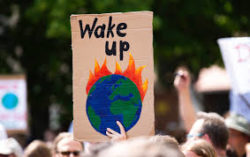The Link Between Climate Change and Human Rights

By Valentina Casulli
Inaction surrounding the climate crisis may be the biggest human rights violation the world has ever seen.
In the 1970s, fossil fuel companies such as Exxon began conducting intense research into climate science. They found that the level of CO2 was increasing in the atmosphere as a result of the burning of fossil fuels. Exxon’s senior scientist at the time, James Blake, warned the company that if they continued their work in the fossil fuel industry, the damage to the environment would result in a global average temperature increase of two or three degrees - startling findings that are very much in line with the climate science of today.
Nevertheless, fossil fuel companies continued to burn fossil fuels and began investing billions in marketing tactics and campaigns to hide the truth. In doing so, they worked to convince the public that climate change wasn’t real, damage the credibility of climate scientists and push the idea that the burning of fossil fuels was crucial to development and industrialisation. By manufacturing this doubt, they have turned climate change into a political idea, a debate, rather than a scientific fact that requires immediate action.
Following InsideClimate News’ 2015 investigation into the history of Exxon’s knowledge surrounding climate change, the dark truths behind the company’s past have been increasingly brought to the surface, along with those of other companies such as Shell. These investigations have revealed just how much they really knew about climate change and how hard they worked to lie and deceive the rest of the world as to the extent of the catastrophe they were leading us towards. This has led to numerous lawsuits being filed against various fossil fuel companies in recent years, wanting to hold them accountable for the damages they have caused and the misinformation they have fed to the public.
In 2021, it is glaringly obvious that the repercussions of climate change are being felt all over the world. However, indigenous people and BAME communities, particularly in the global south, have been feeling the effects of the climate crisis for decades, being disproportionately affected by the damages fossil fuel companies are largely contributing towards.
Each year is seeing an increase in the number of climate migrants, with countries in Latin America, Sub-Saharan Africa and South-East Asia being amongst those most affected. This comes as a result of extreme weather events which are now occurring multiple times a year, as well as rising sea levels, the increased spread of disease and food and water scarcities.
In the US, Black people are 75% more likely to live in areas close to oil and gas facilities, referred to as “fence-line” communities. In the UK, a 2019 study by Natural England found that minority ethnic UK citizens are 19-29% more likely to be exposed to particulate matter pollution than their white counterparts. These factors lead to an increased risk of cancer, lung disease and other respiratory-related illnesses amongst communities of colour.
For many indigenous and BAME communities, the climate crisis threatens their culture and very existence, as they often rely heavily on natural resources from the land meaning that the consequences of climate change are impacting their way of life and survival. In addition to this, indigenous activists are fighting to protect their land and their people, but are also putting themselves in grave danger by doing so. In 2019, 212 environmental activists were murdered around the world, with activists from indigenous communities accounting for 40% of this figure, many killings being connected to fossil fuel companies.
Looking at the examples above, which by no means make up an exhaustive list, it is clear just how much of a detrimental impact climate change is having, taking away people’s human rights to a safe living environment, the access to food and water and overall security. By ignoring and hiding, whilst massively contributing to the climate crisis, fossil fuel companies have the blood of millions of people on their hands, both directly and indirectly. In order to win the fight for our environment and our people, we must see systemic change and more regulation from governments that so far have turned a blind eye, placing profit over people. Fossil fuel companies have wound a deceitful and dangerous web, catching in it the most marginalised and vulnerable amongst us and it is time they were brought to justice.
Valentina Casulli
